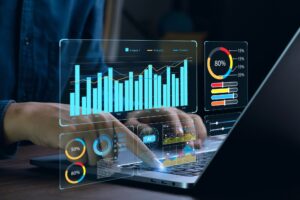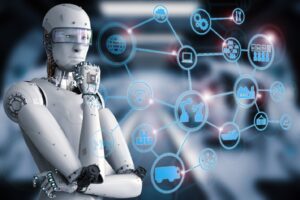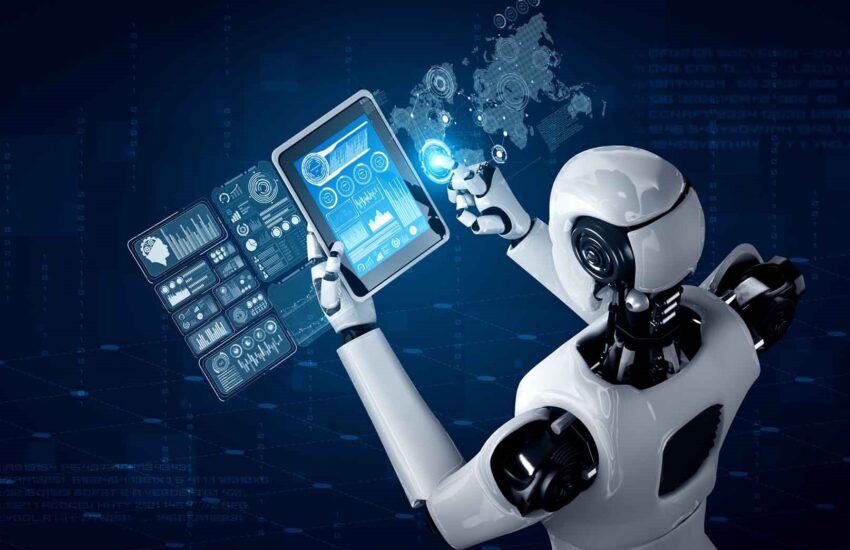Artificial Intelligence (AI) is spearheading the latest industrial revolution, transforming how companies operate, innovate, and grow. AI-driven automation, predictive analytics, and personalized customer experiences are not only improving efficiency but also opening new revenue streams. This article explores how companies in manufacturing, retail, and logistics are leveraging AI to optimize supply chains, enhance customer satisfaction, and ensure resilience in volatile markets. With real-world examples and a look at future industry trends, this read positions AI as essential for C-level strategies in the modern industrial landscape.
In a Future-Proof Enterprise: can AI Rewrite Competitive Advantage?
In the fast-paced digital economy, Artificial Intelligence (AI) has moved beyond experimental stages to become a powerful force driving transformative change across industries. By 2030, AI is projected to contribute over $15 trillion to the global economy, marking a monumental shift that forward-thinking executives can’t afford to ignore. Here’s how AI is reshaping competitive advantage and why it’s essential for future-proofing enterprises:

- Enhanced Decision-Making Through Predictive Analytics
AI’s predictive capabilities allow organizations to process vast datasets in real-time, making it possible to anticipate market shifts, consumer demands, and operational inefficiencies before they impact the bottom line. For example, AI-powered forecasting tools in retail help optimize stock levels based on projected demand, avoiding costly overstock or understock situations. In finance, predictive analytics enable firms to adjust portfolios dynamically, ensuring risk is managed proactively. By embedding predictive AI into decision-making processes, companies gain a significant edge over competitors who rely on traditional, reactive strategies.
- Operational Efficiency and Cost Reduction
AI-driven automation allows companies to streamline repetitive tasks, reduce manual errors, and optimize resources. In sectors such as manufacturing, AI can automate production lines, enhance quality control, and even predict machinery maintenance needs, leading to reduced downtime and improved productivity. According to a McKinsey report, companies implementing AI-driven automation see an average productivity increase of 30%. This efficiency not only improves the cost structure but also enables businesses to focus their workforce on higher-value activities, thereby maximizing ROI.
- Personalization at Scale for Improved Customer Retention
With AI’s ability to analyze customer data in real time, businesses can deliver personalized experiences that meet individual customer needs at every touchpoint. In retail, for instance, AI enables targeted marketing based on purchase history and preferences, increasing conversion rates and customer loyalty. In the banking sector, AI-driven recommendation engines suggest financial products tailored to customers’ unique profiles, enhancing client satisfaction. As personalization becomes an expectation, not an option, AI helps businesses retain customers in an increasingly competitive landscape.
- Risk Management and Fraud Detection
For finance, insurance, and healthcare industries where risk management is paramount, AI provides enhanced fraud detection and risk assessment capabilities. By identifying anomalous patterns in vast amounts of transaction data, AI can flag potentially fraudulent activities instantly. AI also supports robust risk assessment, allowing companies to adjust policies and protocols in real-time, thereby protecting their assets and reputation. The capability to manage risk dynamically contributes directly to an organization’s long-term stability and trustworthiness, bolstering its competitive stance.
- Scalable Innovation and New Revenue Streams
AI fuels innovation by accelerating R&D, helping companies bring new products and services to market faster than ever before. With AI, firms can simulate various business models, assess market responses, and refine product offerings based on real-time data, reducing the time to market and associated costs. For instance, in pharmaceuticals, AI expedites drug discovery processes by analyzing molecular data and predicting drug efficacy, drastically shortening development timelines. By innovating faster, companies stay ahead of industry trends, capturing market share and opening new revenue channels.
- Building Resilience for Market Volatility
In a world where change is the only constant, AI allows companies to be agile and resilient. AI-powered systems can detect early warning signs in the market, allowing firms to pivot their strategies in response to shifts in consumer behavior, regulatory changes, or supply chain disruptions. For example, during the COVID-19 pandemic, companies that utilized AI to monitor supply chains could adapt quickly to shortages and demand fluctuations, maintaining operational continuity. AI-driven resilience ensures that businesses not only survive disruptive events but thrive in them, providing a robust competitive advantage.
- Data as a Strategic Asset
As data grows exponentially, AI turns it into a powerful strategic asset. Organizations that leverage AI to analyze and utilize their data can uncover actionable insights that drive innovation, customer satisfaction, and growth. AI’s data-crunching ability can highlight trends and opportunities previously buried in vast datasets, helping executives make informed decisions with confidence. This strategic use of data positions AI-driven companies as leaders in their sectors, as they can better predict, adapt to, and capitalize on market changes.








